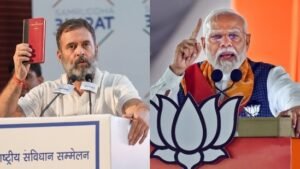In a significant development amidst the ongoing Lok Sabha elections, former Congress president Rahul Gandhi has accepted an invitation for a public debate with Prime Minister Narendra Modi. The invitation, extended by former judges Madan Lokur and AP Shah, alongside senior journalist N Ram, aims to provide a non-partisan platform for political leaders to address critical election issues directly to the citizens.
Rahul Gandhi’s acceptance of the challenge sets the stage for a potentially historic showdown, highlighting a departure from traditional campaign tactics and emphasizing transparency and accountability in the electoral process.Challenge
Invitation Accepted: Rahul Gandhi Steps Up to the Challenge
Rahul Gandhi, in a bold move, responded positively to the invitation, stating, “Congress welcomes this initiative and accepts the invitation for a discussion.” He emphasized the importance of such a debate in enabling voters to understand the respective visions of the major political parties, thereby making informed choices in the democratic process.
Expressing hope for Prime Minister Narendra Modi’s participation, Gandhi highlighted the significance of major parties presenting their visions on a common platform, asserting, “It would be a positive initiative for the major parties to present their vision to the country from one platform for a healthy democracy.”
स्वस्थ लोकतंत्र के लिए प्रमुख दलों का एक मंच से अपना विज़न देश के समक्ष रखना एक सकारात्मक पहल होगी।
कांग्रेस इस पहल का स्वागत करती है और चर्चा का निमंत्रण स्वीकार करती है।
देश प्रधानमंत्री जी से भी इस संवाद में हिस्सा लेने की अपेक्षा करता है। pic.twitter.com/YMWWqzBRhE
— Rahul Gandhi (@RahulGandhi) May 11, 2024
Rahul Gandhi’s acceptance of the debate challenge comes on the heels of his statement at a rally in Uttar Pradesh, where he expressed his readiness to participate in a debate with Prime Minister Narendra Modi. Furthermore, Gandhi mentioned that Congress President Mallikarjun Kharge was also open to participating in such a debate, showcasing unity within the party regarding the initiative. Kharge affirmed, “We agree that such a debate will help people understand our respective vision and enable them to make an informed choice.”
While Rahul Gandhi has accepted the invitation, the ball is now in the court of Prime Minister Narendra Modi. The specifics and structure of the debate can be discussed “if and when the Prime Minister agrees to participate,” – indicating a readiness on the part of the Congress leader to engage constructively on critical election issues.

The proposal for a public debate comes at a crucial juncture in the ongoing Lok Sabha elections, with the nation already at the midpoint of the electoral process. The invitation underscored the need for substantive responses from political leaders to address the questions and concerns raised during the campaign.
Need for American sort of Political Debates
Rahul Gandhi’s acceptance of the invitation reflects a willingness to engage in a transparent and accountable manner, allowing voters to assess the competing visions offered by the major political parties. It also signals a departure from traditional campaign tactics, providing an opportunity for direct engagement between political leaders and the electorate.
While public debates between political leaders are common in several democracies, such as the United States, where they have been a fixture of the political landscape since the mid-20th century, they are relatively rare in the Indian context. A public debate of this nature holds the potential to set a precedent for future electoral contests, fostering greater transparency and accountability in the democratic process.
As the nation awaits Prime Minister Narendra Modi’s response to the invitation, all eyes are on the potential outcome of this historic proposal. Rahul Gandhi’s acceptance demonstrates a commitment to democratic principles and transparency in the electoral process. If realized, the public debate could mark a significant milestone in Indian politics, empowering voters to make informed decisions based on direct engagement with political leaders.











